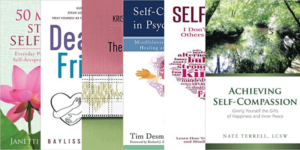
On the contrary, feelings of inferiority, shame and self-criticism can have a negative impact on our health and well-being (irons and beaumont, 2018).
You are reading: Books about self compassion
In today’s extremely competitive culture, too often we compare ourselves to others and launch harsh self-criticism when we feel like we don’t measure up.
The reality is that life is imperfect, and so are we. self-compassion teaches us to embrace our unique selves and leave judgment and self-criticism behind so that we can live a fuller and more contented life.
This article will guide you through some of the best books on self-compassion, as well as companion workbooks and audiobooks to get you or your clients on the path to a more compassionate self.
Before we continue, we thought you might like to download our three self-compassion exercises for free. These detailed, science-based exercises will not only help you increase your self-compassion and kindness, but will also give you the tools to help your customers, students, or employees show more self-compassion. .
top 9 books on self-compassion
Let’s start this incredible list with a selection of nine books, dedicated exclusively to the concept of self-compassion.
1. self-compassion: the proven power of being kind to yourself – kristin neff
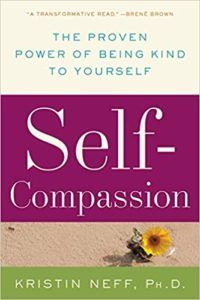
In this highly engaging, easy-to-read, and accessible book, Neff uses solid empirical research, personal stories, and a little humor to explain how we can heal destructive emotional patterns to become healthier, happier, and more effective.
p >
The Proven Power of Being Kind to Yourself offers practical exercises and action plans for dealing with all kinds of emotionally debilitating everyday struggles, from trying to lose weight to parenting and everything in between. like all of neff’s works, it emphasizes the importance of giving yourself the same loving support you would a friend in their time of need.
neff’s book calls for many research studies to outline specific behaviors and thoughts that comprise self-compassion, and specific ways in which it can help in our happiness, relationships, and general interactions with the world around us.
As I’ve defined it, self-compassion involves three main components. First, it requires self-kindness, that we be kind and understanding to ourselves rather than being harshly judgmental and judgmental. second, it requires recognition of our common humanity, feeling connected to others in life experience rather than feeling isolated and alienated by our suffering. Third, it requires mindfulness: that we hold our experience in balanced awareness, rather than ignoring our pain or exaggerating it. we must achieve and combine these three essential elements to be truly compassionate with ourselves.
This book is an Amazon bestseller and the #1 new release in social work.
*note: the original April 2011 edition of this book was called Self-Compassion: Stop Punishing Yourself and Leave Insecurity Behind.
look for the book on amazon.
2. how to be kind to yourself: the daily guide to self-compassion – laura silberstein-tirch, psyd
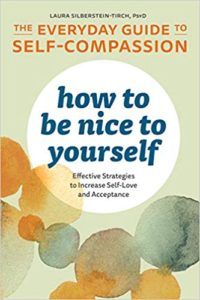
Based on a variety of sources including mindfulness, meditation, and acceptance and commitment therapy, the book outlines a wide range of simple strategies and techniques to start practicing self-compassion today.
Self-reflection exercises and timely experiential practices guide us through an exploration of the deceptive ways we carry shame, helping us move from harsh self-judgment to warm understanding; teaching us to bring compassion to difficult emotions, unhelpful thoughts and behaviors.
Along with proven strategies and practical advice, silberstein-tirch shows us how to personalize our self-compassion practice by creating a personalized plan based on what matters to each individual reader and the kind of changes you want to see in your life. .
Practical, beautifully written and organized, this is an excellent resource for learning to be kinder to yourself with the techniques that work best for you.
look for the book on amazon.
3. self-compassion in psychotherapy: mindfulness-based practices for healing and transformation – tim desmond, lmft
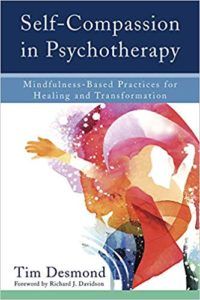
Desmond’s book is intended to help clinicians apply the art and science of self-compassion in their daily therapeutic work with clients; integrating traditional Buddhist teachings with cutting-edge science from the fields of neurobiology, cognitive neuroscience, psychotherapy outcomes research, and positive psychology.
While the first two chapters illustrate the science behind self-compassion and why it is so beneficial in therapy, the rest of the book offers practical clinical applications; Evidence-based techniques to build tolerance and emotional regulation, as well as work with self-criticism, self-sabotage, trauma, addiction, relationship problems, and more.
Research has shown that self-compassion is one of the strongest predictors of mental health and well-being and that it is a skill that can be learned and strengthened through practice by targeting the brain’s compassion center, or “attention circuit”, using techniques.
self-compassion in psychotherapy uses case studies to show readers how to apply these techniques in treatment, supporting effective therapy in two important ways: (1) by helping clients become a source of compassion for themselves ; and (2) help therapists generate more compassion for their clients.
although this book is primarily intended for clinicians and those working with mindfulness-based therapies, including acceptance and commitment therapy (act), dialectical behavior therapy (dbt), mindfulness-based stress reduction (mbsr) and mindfulness-based cognitive therapy. therapy (mbct): can also be useful for researchers, teachers, and students at all levels of experience.
look for the book on amazon.
4. The Conscious Path to Self-Compassion: Breaking Free from Destructive Thoughts and Emotions – Christopher K. German, PhD
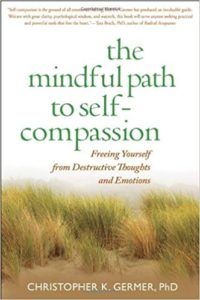
Using mindfulness as a vehicle for developing self-compassion, Germer writes with intelligence and clarity, offering scientifically grounded strategies for putting self-compassion into practice.
The Conscious Path to Self-Compassion offers practical techniques for living more fully in the present moment, especially when difficult emotions such as anxiety, sadness, anger, or loneliness arise, and for being kind to yourself when you need it most.
Included in these techniques are simple and effective meditation exercises to help develop habits of mindfulness that can serve us well in times of stress and difficulty, and to live more intentionally in our lives on many levels. Germer’s Step-by-Step Guide to Meditative Practice makes it easy to follow and also offers options for what best suits the reader’s lifestyle.
The book incorporates numerous scientific studies demonstrating the power of mindful self-compassion and provides very detailed descriptions of the fundamentals of both loving-kindness meditation and mindful awareness. is an excellent resource for beginners and experts alike.
look for the book on amazon.
*free audio downloads of the meditation exercises are available from the author’s website: www.mindfulselfcompassion.org
5. The Neuroscience of Empathy, Compassion, and Self-Compassion – Larry Charles Stevens and C. chad woodruff
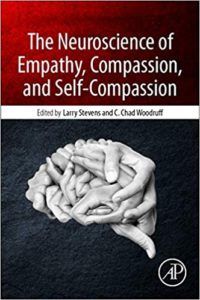
Opinions include discussions of terrorism, cruelty, homicide, suicide, and other examples of compassion counteracting, as well as recent findings from mirror neuron research and autonomic nervous system reflexes of the ECS.
This well-researched reference book surveys the considerable body of electrocortical research, including the spectral power, coherence, and evoked potential of the electroencephalogram, and the growing number of neuroendocrine studies in recent decades. the authors do an excellent job of presenting scientific and technical information in a humanistic way, using philosophical inferences and everyday experiences as examples.
They also present research on “real-world methods” for improving self-compassion, going so far as to point out when they are reporting scientific fact and when they are speculating. The book includes real-world methods such as mindfulness, mantra, and metta meditations, as well as their effects on the ECS and the brain.
Throughout the reference, stevens and woodruff encourage further research, as well as continued creative philosophical and scientific inquiry into the critical social constructions of self-compassion, compassion, and empathy.
look for the book on amazon.
6. achieving self-compassion: giving yourself the gifts of happiness and inner peace – nate terrell
See Also: Google Books là gì? Làm thế nào để tải sách từ Google Books?
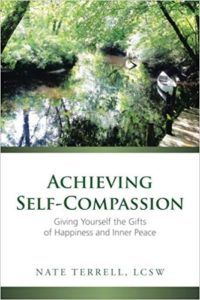
Packed with practical advice and strategies for achieving self-compassion and finding greater happiness and inner peace, Terrell teaches the reader how to enjoy time alone, how to handle criticism, and how to get rid of unwanted thoughts.
>
The book explores the common beliefs that prevent us from living a peaceful life and the importance of not projecting our needs onto others. Terrell emphasizes that there is nothing selfish about treating yourself kindly, feeling worthy, and being happy. These gifts will fill you with positive energy and love that you can pass on to others.
in his introduction, terrell writes:
Our ability to meet the needs of others depends largely on our ability to treat ourselves with compassion. our subsequent sense of happiness, inner peace, and fulfillment frees us to give to other people without exhausting ourselves.
Throughout the book, Terrell talks about her own and others’ experiences overcoming life’s obstacles, including a former client who overcame her depression by learning to be more compassionate with herself.
This is a great guide for anyone who wants to learn simple strategies for self-care, gratitude, anger management, living in the present, positive self-talk, and how to be your own best friend.
look for the book on amazon.
7. 50 Mindful Steps to Self-Esteem: Everyday Practices for Cultivating Self-Acceptance and Self-Compassion – Janetti Marotta, Phd
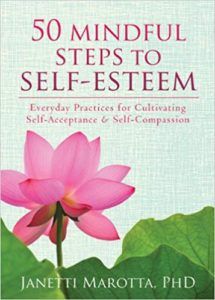
This book is for anyone who wants to improve their self-esteem, inner awareness, and general well-being. Pocket-sized yet powerful, 50 Conscious Steps to Self-Esteem contains timeless mindfulness teachings and practices that are simple, brief, and can be easily incorporated into the reader’s daily life.
In it, Marotta encourages the reader to focus on their thought processes so they can begin to understand what factors lead them to feel bad about themselves and honestly assess those factors without judging themselves. These 50 easy-to-use mindfulness practices teach you how to pay attention to negative thoughts as they occur, accept them, and ultimately control how you react to them.
The book includes journaling exercises to help readers keep track of their thoughts and discover what actions may have triggered positive or negative feelings.
This is a great reference source for finding a suitable meditation for any mood. If you’re looking to cultivate self-compassion and prefer short exercises to long texts, this small but powerful book might be perfect for you.
look for the book on amazon.
8. Simplified CFT: A Clinical Guide to Practicing Compassion-Focused Therapy – Russell L Kolts, Phd
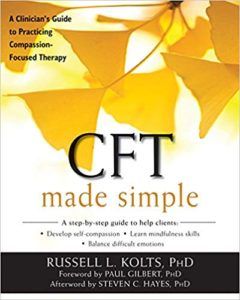
CFT uses Compassionate Mind Training to help clients develop a greater sense of compassion and kindness towards themselves and others and help them feel more confident and better able to handle life’s challenges.
This system of psychotherapy integrates techniques from cognitive behavioral therapy (CBT) with concepts from developmental psychology, social psychology, developmental psychology, Buddhist psychology, and neuroscience, making the theoretical aspects of CBT be a bit difficult to understand.
in cft made simple: a clinical guide to practicing compassion-focused therapy, dr. Russell Kolts makes it “simple” for clinicians with easy-to-follow language and everything you need to start implementing CFT in practice, either as a primary therapy modality or as a complementary approach to acting, CBT u other therapies.
In this book, Kolts offers practical guidance and strategies on how to get started and how to tailor your approach to specific client populations.
look for the book on amazon.
9. become a father again: love yourself as you have always wanted to be loved (self-pity) – yong kang chan
Become a Parent Again is a simple book for anyone who didn’t get the love or approval they wanted from their parents growing up, or anyone who seems to be constantly yearning for someone else’s love, whether it’s a parent, a friend, or partner.
If this sounds like you, Yong Kang Chan encourages you to revisit your childhood so you can stop looking for someone else to fill that void.
Our longing for our parents’ love and approval never really goes away, as the roles of parent and child develop automatically every time parent and child are together, regardless of how much they’ve grown. And since you can’t change your parents, the only way to improve your relationship with them is to change yourself.
chan teaches us that we can all love ourselves and that we can do for ourselves now what our parents couldn’t do for us in the past. this book teaches readers how their childhood could be affecting their adult lives; the dynamics of a parent-child relationship; how to grow your inner father; how to heal your inner child; different protection mechanisms that you may have adopted that unconsciously prevent you from loving yourself; and more.
If you want to develop more self-compassion and a better relationship with your parents, this book is for you.
look for the book on amazon.
a look at the mindful self-compassion workbook
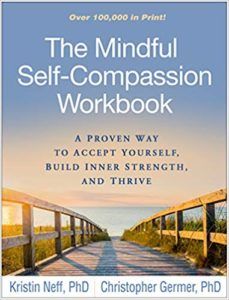
Based on the authors’ groundbreaking 8-week Mindful Self-Compassion (MSC) program, the book offers a step-by-step approach to freeing yourself from self-criticism and harsh judgments, improving emotional well-being, and achieving your highest potential.
/p>
The book comes in a super-sized format and is packed with guided meditations (with audio downloads), reflection questions, exercises, and informal practices to do anytime, anywhere, to help readers discover the powerful and transformative inner resource that is self-compassion.
World-renowned meditation teacher and New York bestselling author Sharon Salzberg says that “using this workbook can effect profound changes in your life.”
rick hanson, ph.d., and author of a bestselling book on resilience says:
drs. Neff and Germer are the world’s leading authorities on self-compassion. They show readers in simple, realistic steps how to become more confident, less self-critical, and kinder to themselves. it feels like they are with you as warm and wise guides on every page of this book. truly a gem.
The Mindful Self-Compassion Manual has already helped tens of thousands of people around the world address health issues, anxiety, relationship stress, weight and body image issues, and more.
look for the book on amazon.
4 more self-pity books
These workbooks are more practical in their approach.
1. dear friend: a mindful self-compassion guide and journal for exploration, reflection, and healing – baylissa frederick
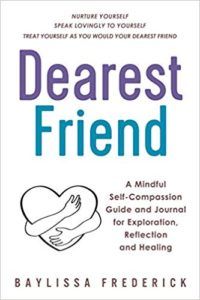
Created as a gentle introduction to the concept, frederick instructs readers to respond to journal prompts as if they were talking to their dearest friend, as being compassionate to others is often more natural and more familiar than being compassionate with oneself.
dear friend is written in a warm and loving tone and teaches readers how to nurture and speak lovingly to themselves, and how to treat themselves as they would their dearest friend. the book explains how self-compassion is essential to healing, wellness, and being able to give to others because, as the saying goes, you can’t pour from an empty cup.
look for the book on amazon.
2. the self-compassion skills workbook: a 14-day plan to transform your relationship with yourself – tim desmond, lmft
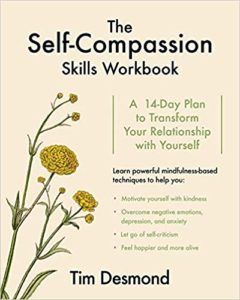
As you may have guessed, Demond describes 14-day exercises that are specially formulated to target and strengthen what neuroscientists call the “attention circuit” of the brain, the part that helps regulate our emotions.
Spending just 30 minutes a day for two weeks on these simple practices can have life-changing results, according to the author and practicing psychotherapist.
See Also: Gary Paulsen – Book Series In Order
The workbook features cutting-edge research showing that self-compassion can be strengthened through practice and that it is one of the strongest predictors of mental health and well-being (Desmond, 2017).
If you’re ready to do the work to improve your ability to motivate yourself with kindness, regulate strong emotions, become more resilient, stop overcoming self-criticism, and heal painful experiences, this workbook might be for you.
>
look for the book on amazon.
*free audio downloads are available with the purchase of this workbook.
3. The Compassionate Mind Workbook: A Step-by-Step Guide to Developing Your Compassionate Self – Dr. chris irons and elaine beaumont
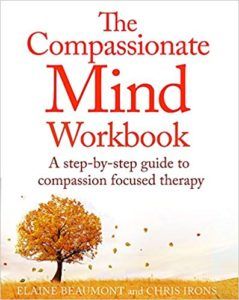
Essentially, it is a step-by-step guide to CFT, helping readers develop a greater understanding of themselves, as well as the skills needed to be more compassionate and work through life’s difficulties and struggles.
The practical exercises, case studies, and suggestions throughout the workbook provide an excellent roadmap for therapists and clients to navigate developing compassion for self and others.
>
look for the book on amazon.
4. The Self-Compassion Workbook for Teens: Mindfulness and Compassion Skills to Overcome Self-Criticism and Accept Who You Are – Karen Bluth, Ph.D., and Kristin Neff, Phd
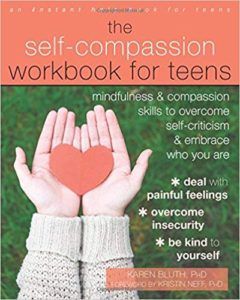
The Self-Compassion Manual for Teens offers valuable tools to help them overcome self-criticism and self-criticism, cultivate compassion, and accept who they really are.
Written by psychologist Karen Bluth and based on the practices of Kristin Neff and Christopher Germer’s Mindful Self-Compassion Program, this workbook offers fun, tactile exercises based on mindfulness and self-compassion to help teens to more effectively face the continuous challenges of everyday life. life.
Adolescent readers will learn specific tools to help them be present to difficult emotions and respond to them with greater kindness and self-care.
look for the book on amazon.
kristin neff’s books on self-compassion
- Self-Compassion: The Proven Power of Being Kind to Yourself
- The Mindful Self-Compassion Workbook: A Proven Way to Accept Yourself, Build Inner Strength, and Thrive (Co-author: Christopher Germer )
- the self-compassion workbook for teens: mindfulness and compassion skills to overcome self-criticism and accept who you are (co-author: karen bluth)
Kristin Neff, Ph.D., is an associate professor of human development and culture at the University of Texas at Austin. Neff, the world’s foremost expert in the field, first established self-compassion as a field of study more than a decade ago and continues her work today, holding workshops and conferences internationally.
In addition to his pioneering research, he co-created an innovative 8-week program called Mindful Self-Compassion with his colleague Chris Germer and has written three books on the subject of self-compassion.
neff’s work powerfully demonstrates the importance of treating oneself with the same loving support one would give a friend, asserting that people who are compassionate to their flaws and imperfections experience greater well-being than those who judge themselves themselves repeatedly (neff, 2015).
dr. neff firmly believes that self-compassion is a much better alternative and a more effective path to happiness than self-esteem, the pursuit of which has become a virtual religion in today’s ultra-competitive culture (neff, 2015).
She believes that our sense of self-worth should not be measured against our past success or failure, nor should it be esteemed against someone else’s. Furthermore, this constant need to feel that we are “better” than others leads to a feeling of isolation and separation.
His research indicates that people who are compassionate about their flaws and imperfections experience greater well-being than those who repeatedly judge themselves, and that self-compassion offers the same benefits as self-esteem (greater happiness, less depression, etc.) without its drawbacks.
Recognizing that the human condition is imperfect, self-compassion allows us to feel connected to others when we fail or suffer rather than feel separate or isolated.
neff’s body of work encourages the development of self-compassion so that, whether we are thriving or struggling, we can embrace ourselves with a sense of kindness and connection, providing the emotional security necessary to make the necessary changes. to address our suffering.
4 self-compassion audiobook recommendations
1. Self-Compassion: The Proven Power of Being Kind to Yourself – Kristin Neff (Author), Xe Sands (Narrator)
Listening duration: 8 hours and 59 minutes *A review of this book/audiobook is offered in the section: “The 9 best books on self-compassion”.
look for the audiobook on amazon.
2. The Conscious Path to Self-Compassion: Breaking Free from Destructive Thoughts and Emotions – Christopher K. Germer, Ph.D. (Author), Stephen R. thorne (narrator)
Listening length: 8 hours and 43 minutes *A review of this book/audiobook is offered in the section: “The 9 best books on self-compassion”.
look for the audiobook on amazon.
3. The Science of Mindfulness and Self-Compassion: How to Develop New Habits to Transform Your Life – Kristin Neff, Ph.D. (Author, Narrator), Shauna Shapiro, Ph.D. (author, narrator)
Listening duration: 7 hours and 11 minutes
This immersive audio program is aimed at psychotherapists, caregivers, meditators, and teachers. As they teach readers how to develop new habits, Neff and Shapiro share amazing scientific insights as well as their personal stories about motherhood and research.
some of the highlights of this audiobook include the three ingredients of effective mindfulness, somatic tools for activating self-compassion, healing trauma, and working with challenging clients.
look for the audiobook on amazon.
4. self-compassion: i don’t have to feel better than others to feel good about myself – simeon lindstrom (author), john malone (narrator)
Listening duration: 1 hour and 36 minutes
This short audiobook encourages self-compassion as a healthier and more realistic alternative to aspiring to high self-esteem or being better than others. Rather than trying to increase self-esteem, if we focus on building a greater sense of self-worth from within, we begin to dismantle the belief that other people win or determine our worth.
Through a series of exercises, this audiobook will propose a gentle yet compelling attitude change that can end feelings of self-loathing, self-doubt, low self-esteem, and shame forever.
look for the audiobook on amazon.
relevant resources (on our blog)
our site is packed with resources on self-compassion and the fantastic work of dr. kristin neff, and below I have included links to some of the most relevant and helpful posts you can find on our blog.
You can also learn more about the Positive Psychology Toolkit – our online platform, containing over 400 exercises, activities, interventions, quizzes, and assessments on various topics, including compassion.
- 20 reasons why compassion is so important in psychology
- 15 most interesting self-compassion research findings
- how to practice self-compassion: 8 techniques and tips
- what is conscious self-compassion? (incl. 3 exercises + workbooks)
- the self-compassion scale and test (incl. pdf)
- what is self-compassion and what is self-love?
- 9 self-compassion exercises & worksheets to increase compassion
- 5 steps to develop self-compassion & overcome your inner critic
If you’re looking for more science-based ways to help others develop self-compassion, this collection contains 17 validated self-compassion tools for professionals. use them to help others create a kinder and more nurturing relationship with yourself.
a message to take home
Self-compassion involves directing the same kind of kindness and care toward yourself that you would toward a loved one who is hurting. Developing this sense of self-compassion begins with acknowledging and accepting your flaws and treating yourself with kindness, even when things go wrong.
Most of us find it much easier to feel compassion for others in their suffering than for ourselves. Using the excellent resources at our disposal, we can cultivate self-compassion, as it is something that can be learned and strengthened with practice, and watch our lives transform.
Among the many changes you can expect to see by being more compassionate towards yourself include better mental health, better relationships, and greater physical well-being.
The reason positive psychology is so interested in the role of self-compassion is that it has the power to transform lives. we hope you take this opportunity to practice some self-love today.
We hope you enjoyed reading this article. Don’t forget to download our three free self-compassion exercises.
See Also: 15 Dystopian Books Like The Hunger Games to Read in 2022